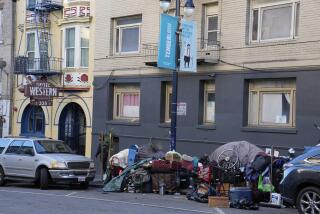Nurse Dispenses Hope to the Homeless of Ventura County : Health: The sick flock to her as she makes her rounds on the streets, offering advice and medical attention to those who often shun help.
- Share via
VENTURA — Packing bandages, antiseptic and other medical supplies, public health nurse Evelyn Burge sets off on her daily rounds, making house calls on people without homes.
As she pulls up to her first stop, she is greeted by a small group of homeless men and women eager for attention to their various medical troubles.
“I’ve had doctors treat me like dirt,” said Carolyn Caron, a 55-year-old disabled woman, who is living in a Ventura shelter. “If it wasn’t for her I just wouldn’t go for help.”
Burge runs Ventura County’s Homeless Health Care Program, a lone nurse attending to the medical needs of an estimated 4,000 homeless people. She dispenses free Band-Aids, medicine and advice.
In the past two years, Burge has built a large and loyal following among the “medically indigent,” treating people with serious illnesses and infectious diseases who have been untouched by conventional medical methods.
“She treats you like a human being,” said Caron, who has sought relief for foot and skin maladies. “I love her for that.”
Burge does not keep office hours, spurns paperwork and carries no appointment book. Meeting with patients spontaneously at homeless hangouts, her unorthodox methods appear to be paying off. Only rarely does she have to ferret out the sick. They come to her.
“I’ve never seen people more appreciative of a Band-Aid,” said Burge, 51, who left teaching 12 years ago to become a public health nurse.
Over the years, Burge has stretched a tiny budget to provide preventive care to hundreds of homeless who might otherwise have ended up in the emergency room at county expense.
“It’s like a miracle that she’s flying solo and doing as much as she’s doing,” said Nancy Nazario, coordinator of the county’s homeless ombudsman program. “She’s saving the county a lot of money and helping people who really need it.”
Nazario said no formal studies have documented the effectiveness of the one-woman health care program.
“Let me put it this way,” Nazario said. “If Evelyn can prevent 10 emergency hospitalizations a year, she’s got her salary covered right there.”
If detected early enough, most medical problems of the homeless can be treated outside a hospital, Burge said. She completed the only countywide study on medical needs of homeless people in June, 1990.
In that survey, all 235 homeless people interviewed needed some form of medical attention. Their most common problems were trauma, alcoholism, mental illness and dental emergencies.
The study turned up two homeless people with the AIDS virus and one man with a full-blown case of tuberculosis. More than two-thirds were uninsured and almost 40% named the county hospital emergency room as their primary source of medical care.
“Before, when they got sick they would put it off, wait and see if it would just go away,” Burge said. “Now they come to me before things get serious.”
The project is funded by a $40,000 grant from Proposition 99, the tobacco tax initiative approved by voters in 1988. The grant pays Burge’s salary and covers some transportation and medical supply costs.
Out of the minuscule budget, Burge has patched together an informal health care network for the homeless. A thick black binder she carries lists a volunteer corps of about 70 physicians who provide services ranging from physicals and immunizations to oral surgery and chiropractic care.
Prescription medications she doles out are donations from physicians and samples she says she has “begged, borrowed and stolen.” At her urging, the county hospital recently made a four-day stint with Burge a mandatory part of its family practice residency program.
Pat Disprow, 35, of Ventura first went to Burge two years ago with an ear infection. She had seen a physician who gave her medication, but her ear still hurt and she could not afford a return visit.
“I was getting discouraged,” said Disprow. “I didn’t want to take the medicine anymore.” Burge reassured her and Disprow continued taking the medicine until the infection cleared up.
“Now I tell everyone about her,” she said. “It’s nice to have somebody who comes to us.”
For her part, Burge maintains a firm but friendly distance from her clients, never forcing treatment or questioning other aspects of the lives of those she treats.
“I (couldn’t) care less what else is going on, as long as they are trying to take care of themselves,” she said. That approach has built a level of confidence that keeps her patients coming back.
“Since a lot of them don’t have regular addresses, it was hard before to keep track of them,” she said. “But I pretty much know where everyone is.”
More to Read
Sign up for Essential California
The most important California stories and recommendations in your inbox every morning.
You may occasionally receive promotional content from the Los Angeles Times.













